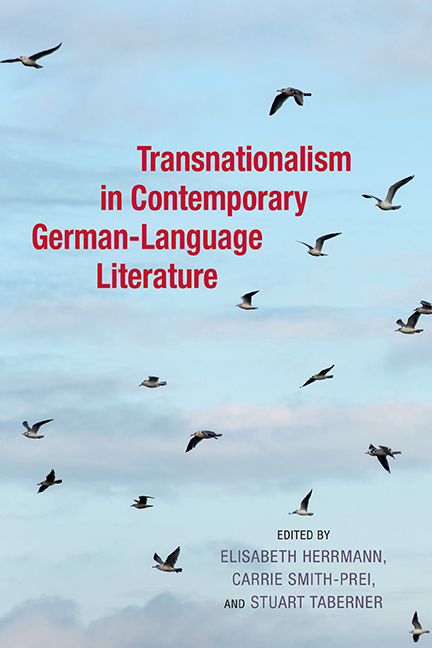11 - “Wo geh ich her? . . . Wo komm ich hin?”: Delineating Transnational Spaces in the Work of Juli Zeh
Published online by Cambridge University Press: 10 June 2021
Summary
BEI DER GESCHICHTE,” Juli Zeh writes in Treideln (Towing), her 2013 poetics lecture at the Goethe University in Frankfurt, “gibt es ein Außerhalb. Sie ist ein (fiktives) Stück Lebenswelt mit einer anderen Lebenswelt drumherum… . Wer schreibt, schwingt sich auf zu einem Gott, der Welten erschafft, um sie erkennend überdauern zu können.” (A story has an outside. It is a [fictional] piece of a lived-in world with another lived-in world around it… . An author soars to be a God, a creator of worlds who outlives them while seeing through them.) Part of any narrative created by an author, whether a deity or not, is its spatial and, more specifically, geographical and territorial setting. Although Zeh in her self-proclaimed antipoetics does not mention this aspect of literature—she focuses predominantly on the narrator's perspective and narrative time—it is still useful to examine more closely the spaces she creates in her fictional and nonfictional texts. More specifically, I propose to have a closer look at what Barbara Piatti in her 2009 study Die Geographie der Literatur (The Geography of Literature) has categorized as “Handlungsraum” (space of action), that is, the linguistically created space inhabited by the personnel of any text. While this space will be the focus of the analysis, I propose that, to once again borrow Piatti's terminology, the “durchlässige Membran zwischen den Welten” (GdL, 19; permeable membrane between worlds), that is, the intersection between the geographical world we inhabit and the geographies within narrative works, is of equal importance. According to Piatti, geography is a point of contact between inner-textual and extra-textual worlds (GdL, 19). If we accept this claim, I would like to argue that it is this point of convergence that allows for the inclusion of Juli Zeh's work, even though her texts are generally not situated in a discourse devoted to a negotiation of what the term transnationalism might mean at the beginning of the twentyfirst century. Conventionally, Juli Zeh is read as an author who with great persistence comments on current sociopolitical developments both within and outside of her literary and nonfictional texts, a reading confirmed by her recent involvement in the international protest against NSAsurveillance, to give but one example.
- Type
- Chapter
- Information
- Transnationalism in Contemporary German-Language Literature , pp. 228 - 246Publisher: Boydell & BrewerPrint publication year: 2015

